It's a very big deal for musical Prague: Czechia's symphonic epic, the six tone poems that make up Smetana's Má vlast (My Homeland), launches every Prague Spring Festival at the Smetana Hall, but in the Czech Philharmonic's opulent home, the Rudolfinum, the work hasn't appeared in any of its seasons for 49 years. This is also an important test case for the orchestra's chief conductor and music director since the beginning of the 2018-19 season, St Petersburg-born Semyon Bychkov: will he give this hard-to-please audience the essence of what it expects?
The answer seems to be a "yes," by and large if not unanimously as far as the press are concerned; but I spoke to a key member of the orchestra afterwards, and she said this had been the turning point in Bychkov's winning over the majority of the players. Tearful congratulations had been rife; section principals in featured solos had clearly played their hearts out. If it's possible to generalise about such a wide-ranging work, this was a weighty Má vlast, not in the lighter Bohemian idiom favoured by the likes of Kubelik and the latest native number one on the conducting scene, Jakub Hrůša, who opened this year's Prague Spring Festival with his Bamberg Symphony Orchestra.
Yet darkly compelling is what Bychkov does best, and certainly I've never experienced a greater onrush of power at the start of "From Bohemia's Woods and Fields," or a greater sense of the modern in Smetana's writing both in the veiled fugal passage here or in other key passages throughout the work (quieter dynamics were atmospherically conveyed throughout). Rudolfinum acoustics are tricky: it has a reverberance which can verge on a Turkish bath-house, as John Eliot Gardiner has described it, but it's wonderful for enriching individual instrumental timbres – and alongside the triangle-ringing, cymbal crashing pomp, Smetana offers many of those.
This was a perfect situation, too, to respond to the performance, think it over and meet Bychkov the next morning in his hotel on the other side of the River Vltava to talk it over. Ostensibly an original plan had been to talk about his "Tchaikovsky Project" with his Czech orchestra, but impressions of the work to hand were still too strong for both of us. From the specific we eventually proceeded to the general. We were talking first about the two harpists, Jana Boušková and Barbara Pazourová, who had moved him by coming to see him afterwards. The harps begin Má vlast, and their position is crucial.
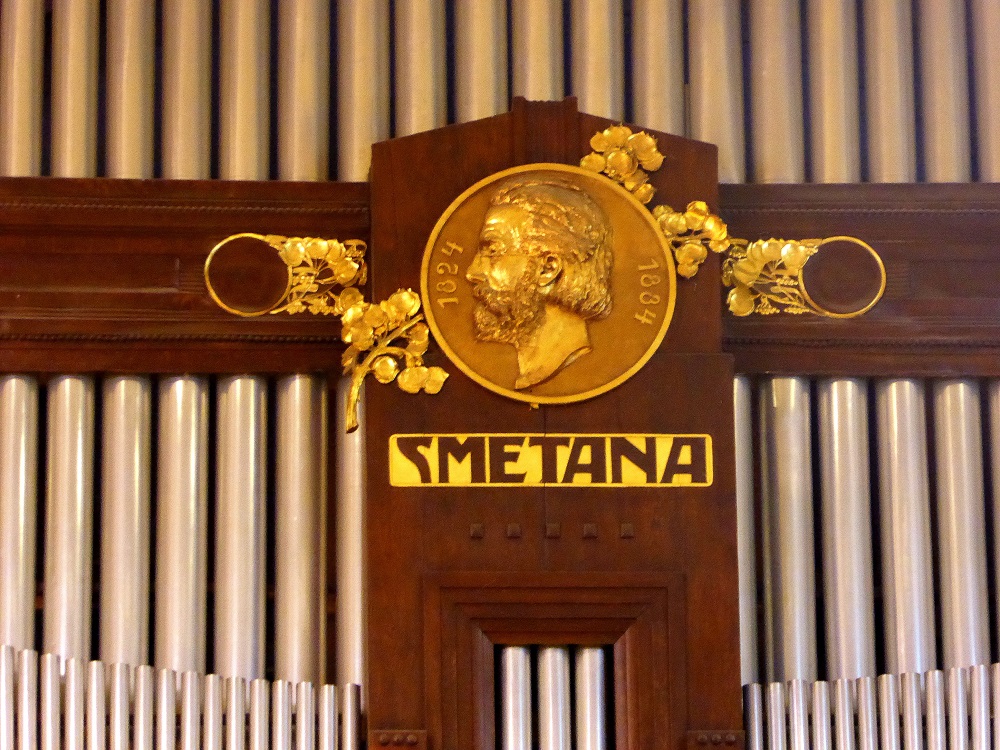
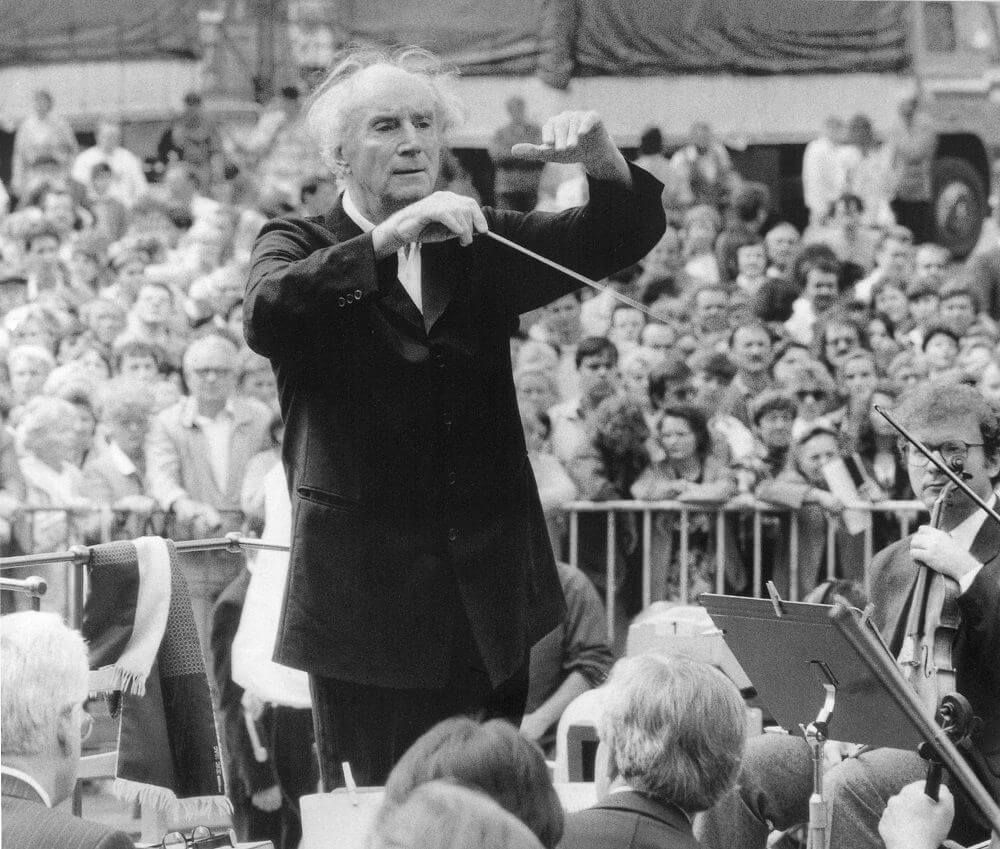 DAVID NICE There’s a recording I heard of [Vaclav] Talich conducting an historic performance during the Second World War.
DAVID NICE There’s a recording I heard of [Vaclav] Talich conducting an historic performance during the Second World War.
It was picked up by the French radio. I have to say, with all of my admiration, because this man really made this orchestra great, there are a lot of weaknesses in the playing, in the winds for instance, and there are some decisions he makes – in the "Blaník" movement [the last, moving beyond the Hussite conflict to hope of a brighter future], the pastoral episode with the winds and the horn –
That was one of the most beautiful moments for me last night, it moved me to tears. The principal oboist [Jana Brožková] made a unique sound.
She’s never played it before, because they are doubling, and she played it for the first time yesterday, she’s an angel. There is nothing she cannot do in sensitivity.
But it’s such a powerful sound she can make, too.
Yes. And on the Talich recording, I was so shocked by how fast he went, he just zipped through it, there was no time for them to breathe, to phrase, and I don’t know why. One day I’ll ask him, but I’m not yet up there! Here they’ve preserved his scores as well as the parts, so when I started researching I got the scores, all six volumes, and the parts, and I was looking at them. It’s really fascinating how he invested himself in it, but there are a lot of changes – many retouchings, a lot in the wind, also in the strings. It’s an historical document, it’s a part of the legend.
Then it’s your decision to choose what works for you.
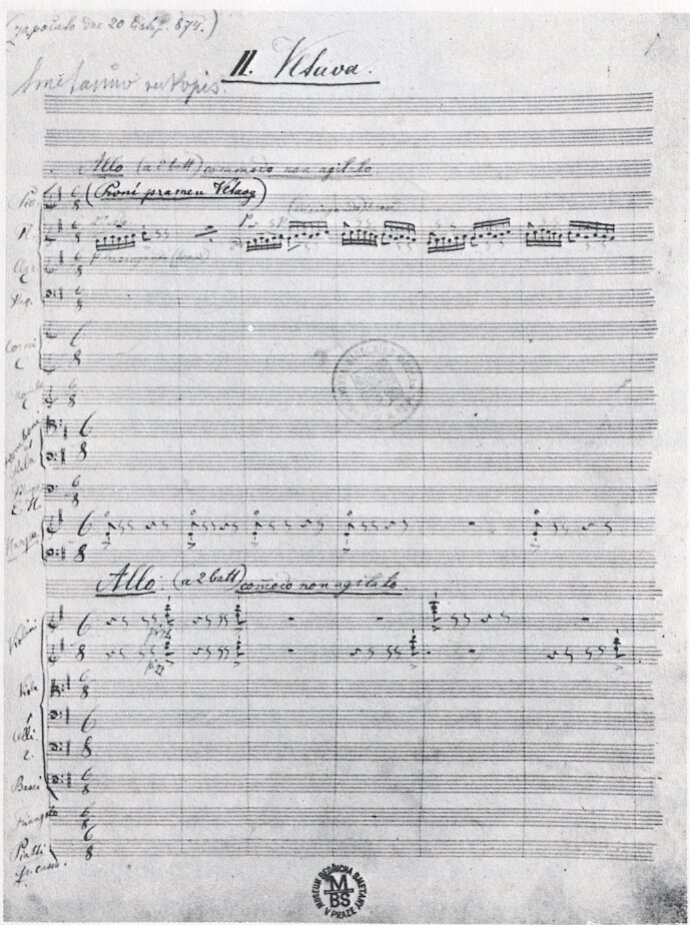 Mostly today I don’t believe we need them. Because one has to remember – in his time they were still playing on gut strings, which is a different sound. The quality of the wind playing was inferior to what it is today, just technically speaking. So when one looks at that one understands why they had to react to what they heard. But looking at the manuscript... I have the facsimile [opening of "Vltava" pictured right], which I brought on stage on Monday and I said, it is staying here, everyone is welcome to look, and whenever there would be questions, “this page, do you see, it says legato here, and you aren’t playing it legato for ever”. “Ah, OK”. And we played from a new set of parts, because when we see a clean page we react to it differently than if we’ve always been playing mindlessly. In the summer, there was a huge discontent about having to play from new parts – huge. I was getting phone calls, I said, it’s the same music, and it’s not there to make any changes to the bowings, it’s just to see freshly what’s always been there but not seen and played. I do that for myself and I know exactly what it means. However many copies I have of the scores that I’ve conducted, when I come back to it, I want it clean, and I still see new things. Then we started rehearsing, and I asked, are the scores OK? Fine, very easy to read, very well printed, and suddenly they see that habit is so powerful, suddenly they feel insecure, it’s crazy.
Mostly today I don’t believe we need them. Because one has to remember – in his time they were still playing on gut strings, which is a different sound. The quality of the wind playing was inferior to what it is today, just technically speaking. So when one looks at that one understands why they had to react to what they heard. But looking at the manuscript... I have the facsimile [opening of "Vltava" pictured right], which I brought on stage on Monday and I said, it is staying here, everyone is welcome to look, and whenever there would be questions, “this page, do you see, it says legato here, and you aren’t playing it legato for ever”. “Ah, OK”. And we played from a new set of parts, because when we see a clean page we react to it differently than if we’ve always been playing mindlessly. In the summer, there was a huge discontent about having to play from new parts – huge. I was getting phone calls, I said, it’s the same music, and it’s not there to make any changes to the bowings, it’s just to see freshly what’s always been there but not seen and played. I do that for myself and I know exactly what it means. However many copies I have of the scores that I’ve conducted, when I come back to it, I want it clean, and I still see new things. Then we started rehearsing, and I asked, are the scores OK? Fine, very easy to read, very well printed, and suddenly they see that habit is so powerful, suddenly they feel insecure, it’s crazy.
That was where I was going to start, actually: you face a powerful tradition, you have to have no fear, but do you have to tread cautiously in any way?
Yes, you have to – I would not say cautiously, but respectfully. Because people rightly are very attached and very proud of the fact that they are born into it, they own it, and there is a huge difference between pride and arrogance. Pride must be part of it, they’ve lived with it, heard it since they were born and played it ever since they could play, and so one has to respect it. Which does not prevent you from questioning it just because of some things which were done. My mother taught me when I was a kid if I did something naughty and she would berate me and I would say, but he did it, she would say, well just because he’s an idiot doesn’t mean you have to be one too – it’s the same thing. There is a duality there. And they also have to agree or not agree, but they have to see that you have done your homework [Bychkov pictured below in rehearsal by Marco Borggreve]. 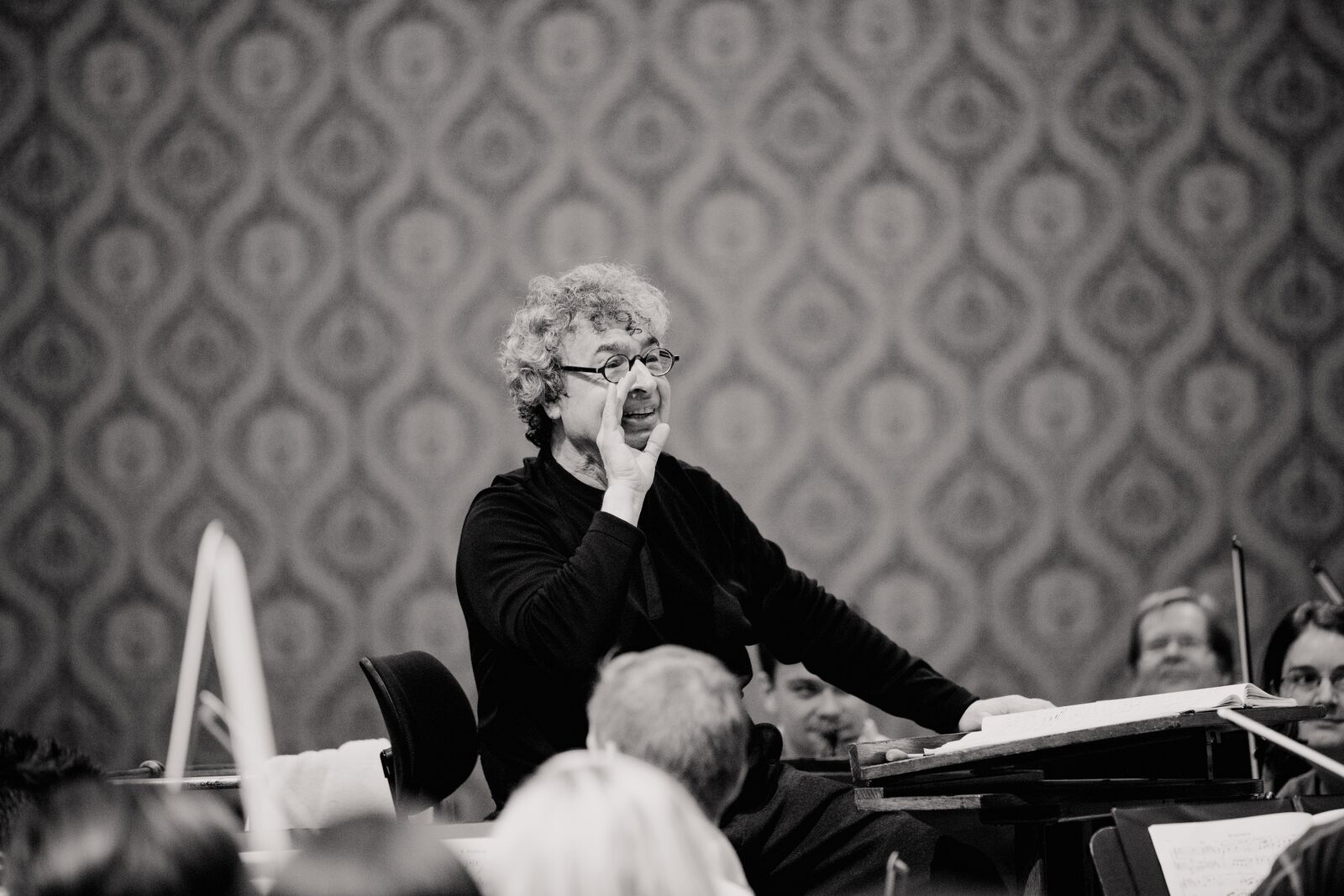 So when I bring this facsimile and I show the difference between this and what they have always played, then they have to argue with Smetana, because I am not important. There was a very interesting conversation last night. Do you remember in "Šárka" [the third movement about the mythical Bohemian warrior-maiden and her revenge on the enemy] after the initial statement comes the march [sings].
So when I bring this facsimile and I show the difference between this and what they have always played, then they have to argue with Smetana, because I am not important. There was a very interesting conversation last night. Do you remember in "Šárka" [the third movement about the mythical Bohemian warrior-maiden and her revenge on the enemy] after the initial statement comes the march [sings].
The men advancing stealthily through the woods.
Now, in the first rehearsal, they played their tempo, because automatically an orchestra that knows the piece inside out will offer you what they know, regardless of what you conduct – in certain places. So the tempo was with great urgency, I heard it, I know this is one of the ways but I don’t feel this tempo – we did it several times, and I brought them down in tempo a little, and explained, they said it’s too slow, I said, why?. And David Mareček [the orchestra's CEO] after the performance said he was so convinced by the tempi and nothing felt too slow – except that. And I said, the tempo you imagine is this – and I sang it to him – and then I opened the score on that page, and I said, look what it says here, moderato assai, all marcia, and here is the metronome, from Smetana – it’s in the manuscript as well. The tempo is 96, and what is 96? “I don’t know.” “Here is the metronome.” [sings it more leisurely]. He said, “oh, it’s a fast tempo”, I said, no, it’s a slow tempo compared to the one you just sang for me. What is the tempo you sang? it is metronome 112. And suddenly there is no discussion, it’s so clear here. You see what I mean? And we’re all like this, every single one of us – you want to hear what you’ve heard before. But when you interpret something, you have to be aware of what people do, but also the departure point is this, the score, after that there may be a divergence, and also you have to know the different composers who use metronome markings, some of them you must follow, like Strauss, and others you cannot, because it does not correspond to reality, and working with living composers, you know immediately, when they write 96 but they mean 107, then you can have a discussion. But you have to imagine something, is it convincing or not? And when I see Smetana’s scores, quite a lot of passages have metronome markings. I see what they are, I try them, if they feel convincing, I go with them, if they do not then you have to find something that feels convincing [Pictured below: statue of Smetana in his native town of Litomyšl].
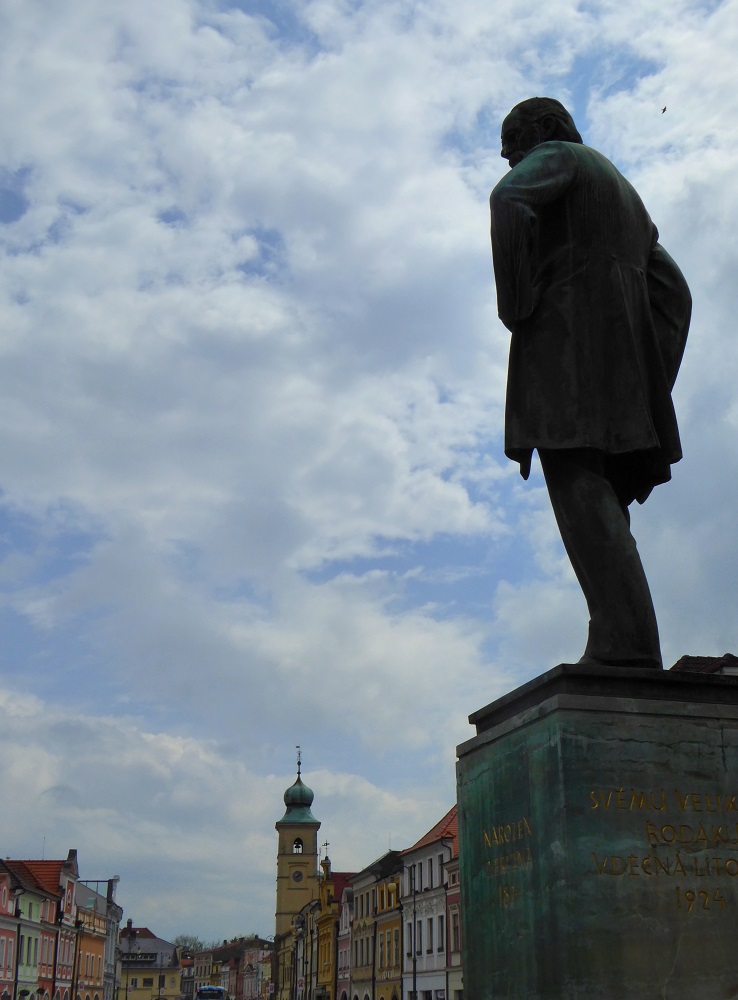
Everyone. But the point of departure is that. That is the weight of tradition. I must say this is the only thing that I really feel strongly about, the departure point, which only one person will offer to us, and that is the composer. You have to find your way with it. And before you try something else, try what is there and see if it feels convincing. It may eventually become something else, and there is no problem, so long as it is convincing. But you cannot just disregard it on the basis of, we know how it goes and here it is. This is meaningless. Then you should play recordings, because they will always sound the same.
There was a very interesting point someone was making recently that we approach new works so freshly, whereas with works we know, it's very difficult to throw off the impact of the recordings we know and love. But a great conductor can always convince, and maybe there will be passages where you think, that’s too fast or too slow, and that’s how you feel it, but there’s always a fundamental musicianship.
All of us change our minds. Do you think I don’t? Every single day, because music is always the same, but we are not, and we don’t always feel the same. That is part of it and that is what makes it really creative and interesting. Every time it must be reborn. But there must be a fundamental idea to all of us who interpret something, that the departure point is the score, and not what we heard before.
And you also have to convince the players that they can play it well, and phrase it properly.
Absolutely. And sometimes it takes time. It’s also physical – you as an instrumentalist know how physical it is. And if the tempo changes drastically, and sometimes not even drastically, there is a point at which you’re comfortable and just a millimetre faster or slower makes it very uncomfortable, et voilà. So that also affects your perception, and when you do it all your life, and then suddenly you’re between two chairs...
Do you feel that you’ve changed anything fundamental about the sound of the orchestra? Or does it simply change from work to work?
In Má vlast?
Let’s say in Má vlast.
No, I don’t think anyone should change the fundamental sound of this orchestra. Because it is unique. That in fact is what makes it so beautiful. Maybe we talked about this in London [where there was a relaxed brunch several months earlier], that all of us are unhappy that most orchestras sound alike, and you cannot tell which is which. Except for a few. And this is one of those. So fundamentally it’s there. It has to be modified and adapted according to the music we play. There is no point in trying to play Stravinsky the way you play Smetana, it’s an absurdity. But in the music on which this orchestra has been built – it’s built on its own music, right? – there the sound is what it is. What will change every time and must are phrasing, articulation: look, "Šárka" [sings legato phrases], do you know that since the beginning they always played it [sings with accent on second note of each group], in the manuscript it’s absolutely clear – legato – first and second notes are slurred with the rest. That’s fine. We try: "do you like it?" "Yes, it feels convincing". So, changed. And there are plenty of examples of this kind that, yes, we will change. There is a very important, tiny moment for celli, also in "Šárka", where there is a dialogue between clarinet solo [sings] and celli, like a recitative. At the very end of the recitative, the lead to the last note [sings], on that note, in the printed editions, all of them, there's a crescendo. In the manuscript, it’s a crescendo-diminuendo inside that note, and the players asked the question, because it was adjusted with my pencil, and I said, in the manuscript it’s written like that, and it makes sense, because it’s a slow appogiatura [sings]. No discussion, that’s fine. That was done without their knowing, but they see the different print, and they question it, which is good, because it must be questioned. [Pictured below by Marco Borggreve: Bychkov studying scores backstage at the Rudolfinum] 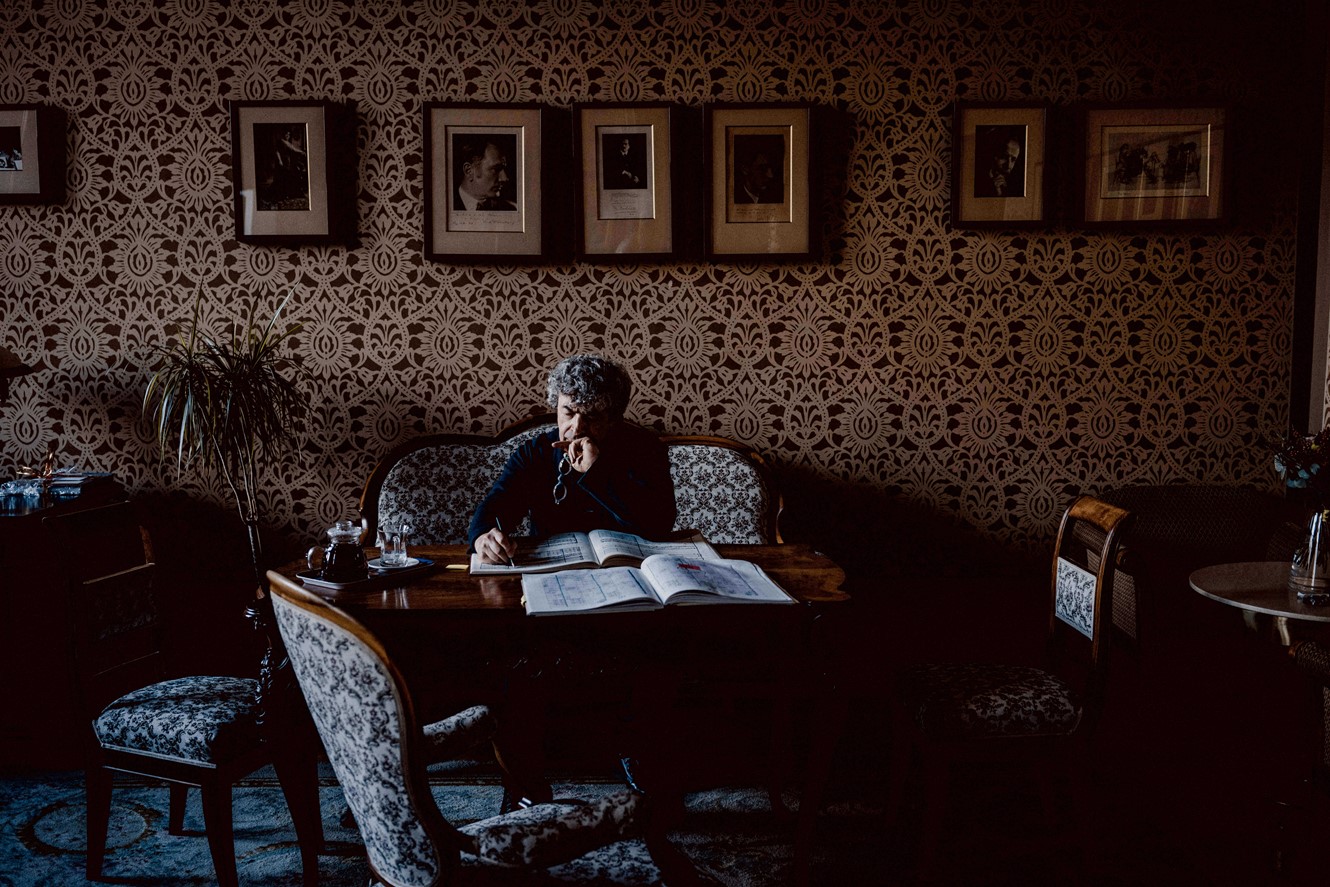 It’s interesting that the players have that much investment in the work to question…
It’s interesting that the players have that much investment in the work to question…
Oh, they do. In the breaks, my score was gone instantly. They were comparing the manuscript with the parts, adjusting, changing. Can you imagine that loving a piece, playing it all your life, will bring so many questions that never get answers? Because there is no time usually, they know it, and nobody asks them, the questions remain unanswered. Suddenly there is the manuscript so all the questions they had for so many years, they can check and see, is it so, or not? And they did.
This particular quality I would ask about, your deep sound, which was new to me in this piece, you get a clarity of articulation of course, because I think of the Czech Philharmonic not as a bass orchestra but as a middle-range, which I don’t mean in a negative sense. There seems to be more weight.
Maybe, it’s possible. I remember my first impression when we started with the Tchaikovsky Project, it was the Pathétique Symphony, that I found the string sound very sweet, very beautiful, of a lighter weight, however one can define it. But it’s only a matter of encouragement. Look at "Vltava" [the second of Smetana's tone poems, the most famous one, about the river that flows through Prague], after the introduction, when the violins play the famous first tune [sings] and, my God, it melts my heart. Except the first note, the upbeat note, it was ordinary. I said, the first note must break the heart, the very first note. Everything else will happen by itself then. Make it warmer, longer, and suddenly the first note emerged. So yes, in that sense one works, and also in Shostakovich Eight, the challenge was – because that really is outside the home territory, and it’s hard stuff. It’s emotionally very hard, and intellectually also very hard to get to grips with, I said, you know, we just have to reinvent ourselves and live the life of the others, which is not necessarily our own. When necessary, unfortunately, there is brutality and ugliness that must come in the sound, so they fought and fought. It has to be that, then it’s credible, otherwise it’s just pretty music. So we made an effort. But yes, there is a depth in the string sound, and there will be even more when we play with 16 first violins, which we rehearsed with for the tour, but last night we played with 14 firsts, 12 seconds, and so on. So there will be even more weight.
You conducted Má vlast first in Cologne?
Yes, with the WDR (West German Radio) Orchestra, my orchestra, it was my first return since I left in 2010, last night was the first time we did it together here, and now it will go to Japan and then Prague Spring, Moscow.
Did you feel, doing it here, that special significance?
Yes. There’s no question about it. It’s the feeling that you have, let’s say, with Mozart or Beethoven in Vienna, or Tchaikovsky in St Petersburg, it’s where this music is born. And that brings something to it that you will not have anywhere else. It’s inevitable. Think of Elgar or Walton, or music that’s dear to you, there is something in it. That is the reason why the nation identifies with its composer, because they somehow reflect the genes of the nation, the national character, the body language, something indefinable, right?
And especially with Smetana and Elgar, I’d say, the air of the natural landscape, and how you possibly begin to talk about that, I don’t know. In the most intimate moments of Elgar…
That’s exactly right. In fact I was thinking about Britten, coming back to the War Requiem in 2013, I think it was…
Absolutely one of the best performances I’ve heard – with the BBC Symphony Orchestra, in the Albert Hall on Armistice Day.
Thank you, David. I was coming back to it after many years, and I was immersing myself in it, and I went to Snape, and to the Red House, they gave me his scores of the War Requiem, so I sat and studied, and then I was walking on the beach at Aldeburgh, and they said, here we did the Peter Grimes production, which sadly I never had the chance to see. I was walking along and I said to myself, OK, many friends have been urging me for a long time to do Peter Grimes, and it just didn’t happen, and other things came along – that’s not the point. But if I were one day to do Peter Grimes I would have to take a sabbatical, go and live in the village, get to know it from the inside, not as a tourist, and understand how people tick. Because it’s so beautiful, but it isn’t so on the inside. The inside can be very cruel and very merciless, and there is nothing romantic about it, and one has to have lived it in order then to express it, otherwise you’re a tourist.
[Here we have what I think of at the time as a long digression, starting with how depressed I was, seeing the "take back control" signs outside every house on the way into town just before the Referendum, to discover that Aldeburgh today is full of middle-class Brexiters – that these are the people who will resist the outsider]
But you know, David, it is so true through practically the whole world at the moment, particularly Europe – forget the States – you have a very strong mobilisation that is based on attachment of your own, designed to protect it, as a reaction. Usually it’s very powerful. And against intrusion and fear of losing your own identity. When it reaches a Brexit level of intensity, then we have the ugliness and chauvinism which is not acceptable, whereas patriotism and even nationalism – nationalism is understandable, patriotism is indispensable, chauvinism is not acceptable.
It’s fear of the other.
Yes. Now, how to find the harmony between the differences, which make the world beautiful, and live together, while preserving our own identity, that is the answer we are searching for and cannot find, that is the tragedy of Brexit for me. But so much goes back into history, nothing started just today, after World War 2, colonialism collapsed, that is a good thing, but the fact that you leave these poor people to their own devices and then you bring many of them in here to do the kind of jobs the locals don’t want to do, cleaning streets or whatever, at the same time you don’t accept them. And they have children who are born here, and in their head they are French or German, and you as a proper Englishmen, whatever that means, feel like you are a guest in your own home, you say, it’s mine, they say it’s theirs, and they are going to fight you, and then you have this horrible conflict we can’t resolve. Merkel opened the doors to refugees in Germany – she’s a very good and spiritual person, the daughter of a priest. For her it was a question of humanity and humanism. You can open the doors, but then if you have no infrastructure to help people settle... I know the situation from the wave of Russian immigration from the Soviet Union to America. There were several hundreds of thousands who left the Soviet Union as the same time as I did. And I never made part of that community in New York because I wanted to integrate myself – not assimilate, integrated, there’s a difference. But how many of those people who came from the same background as I did made any effort to learn the English language, they continued to live the way they had in the Soviet Union, and to complain. And you would say, why did you leave? They left for economic reasons, and at some point it’s not enough.
[I bring up the Scandinavian model of integration and where it seems to be working. Then I feel I've gone on too much and apologise for the digression]
But you know, it’s very revealing – how is it that we started with Má vlast, went to Aldeburgh because of Peter Grimes and from there on made it all the way to this – there’s a reason for it. Because it is connected. You start with a piece of music, and suddenly you realise, it is life itself. And a contemporary life too.
And what does everyone find in Má vlast – because it is a great masterpiece, I think – what do people elsewhere find in it, because it is an international work, what in it transcends? [We head outside so that Bychkov can smoke, and maybe he feels this is a significant point to do so, because he then says:]
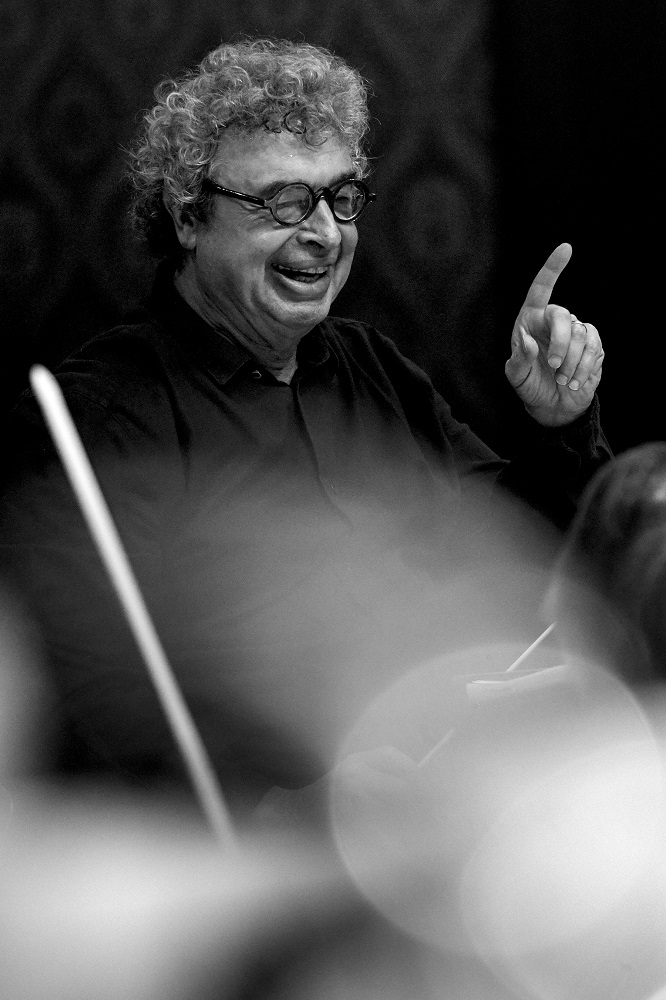 You raise the most fundamental question, the crux. It’s clearly a big question for me. Before I accepted to come here, I never looked at this piece, I was completely unaware of it. I heard here and there "Vltava," because the whole world knows it, and actually you know, it’s really funny, if you hear the Hatikvah, the Israeli national anthem, you think they invented it. No, it comes from here. But I never spent any time with Má vlast, then when I came here. I thought, I must integrate myself with the repertoire that is dear to people here, and Má vlast is the Bible, good. So I started working on it, I studied it for two years, and I said, OK, I will conduct it first elsewhere, which is what I did. And there came a moment after assimilating the material, at first very simple, very easy melodical ideas, then becoming incredibly complicated because yes, the melodies are simple, but the way they reappear is absolutely complex. The way the whole thing works polyphonically is mind-boggling, because you see his intellect work, which is phenomenal. And with that come so many questions, like how do you go from this section to that as a musician, it became incredibly difficult and often frustrating, fine. Then comes a point when you feel it’s kind of in you, and then, I’m doing it in Cologne for the first time, and for probably a month or two before that I realised I was obsessed with the piece. No-one could even talk to me, and then doing it in real sound that was coming from the Cologne players, they didn’t know it, and it was a discovery for them, hearing the real sound, you realise it’s doing something to you that only the greatest music will. And then the question is why, the question you raise. And I started thinking about it, and eventually I stumbled on it, I realised for myself – we all have our homeland, our roots, our identity, all of us, for the Italians it’s "patria mia," for the French it’s "patrie,"’, for the Americans it’s homeland, for the Russians it’s motherland, for the Germans it’s Vaterland. But it is an image of your homeland as you want it to be, which it rarely is, so you realise the contradiction between the dream and the reality, but the dream remains. It’s not an image of the Austrian Emperor on horseback greeting the troops, that has nothing to do with it. And a piece that has so much darkness, because the country was living, historically speaking, in a very dramatic moment of nationalism being felt so strongly, as a reaction to being dominated by the Austrians and the rest, and in the end there was hope. That’s the whole point. The reality is one thing and the dream is another. But the dream remains, the dream wins, he was just ahead of his time, the dream came true in 1918.
You raise the most fundamental question, the crux. It’s clearly a big question for me. Before I accepted to come here, I never looked at this piece, I was completely unaware of it. I heard here and there "Vltava," because the whole world knows it, and actually you know, it’s really funny, if you hear the Hatikvah, the Israeli national anthem, you think they invented it. No, it comes from here. But I never spent any time with Má vlast, then when I came here. I thought, I must integrate myself with the repertoire that is dear to people here, and Má vlast is the Bible, good. So I started working on it, I studied it for two years, and I said, OK, I will conduct it first elsewhere, which is what I did. And there came a moment after assimilating the material, at first very simple, very easy melodical ideas, then becoming incredibly complicated because yes, the melodies are simple, but the way they reappear is absolutely complex. The way the whole thing works polyphonically is mind-boggling, because you see his intellect work, which is phenomenal. And with that come so many questions, like how do you go from this section to that as a musician, it became incredibly difficult and often frustrating, fine. Then comes a point when you feel it’s kind of in you, and then, I’m doing it in Cologne for the first time, and for probably a month or two before that I realised I was obsessed with the piece. No-one could even talk to me, and then doing it in real sound that was coming from the Cologne players, they didn’t know it, and it was a discovery for them, hearing the real sound, you realise it’s doing something to you that only the greatest music will. And then the question is why, the question you raise. And I started thinking about it, and eventually I stumbled on it, I realised for myself – we all have our homeland, our roots, our identity, all of us, for the Italians it’s "patria mia," for the French it’s "patrie,"’, for the Americans it’s homeland, for the Russians it’s motherland, for the Germans it’s Vaterland. But it is an image of your homeland as you want it to be, which it rarely is, so you realise the contradiction between the dream and the reality, but the dream remains. It’s not an image of the Austrian Emperor on horseback greeting the troops, that has nothing to do with it. And a piece that has so much darkness, because the country was living, historically speaking, in a very dramatic moment of nationalism being felt so strongly, as a reaction to being dominated by the Austrians and the rest, and in the end there was hope. That’s the whole point. The reality is one thing and the dream is another. But the dream remains, the dream wins, he was just ahead of his time, the dream came true in 1918.
I was writing a note about Janáček’s Ballad of Blaník, which was the only piece he wrote soon after 1918 which celebrated independence, and it's a short work – Taras Bulba had just been done, and Masaryk, to whom he dedicated two of the pre-1918 scores, was a great figure – once you’d got the dream, then maybe the optimism and struggle aren’t so fierce, because you’ve got what you wanted. And I was saying that Smetana in his "Tábor" and "Blaník" [the diptych which ends Má vlast] anticipated this.
That’s exactly right. And then once I reached that point, I understood why it touches me so much, and then I thought, this is so much our time, and this is what we talked about – the need, the desire, to protect your own identity. But reconciled with the fact that not everybody is like that, and we must live together.
And you go through fearful conflict. A lot of it in Má vlast sounds quite modern, doesn't it?
Totally.
That extraordinary upside-down fugue in "From Bohemia’s Woods and Fields", seems to me to look forward to something like the slow fugue in Nielsen’s Fifth Symphony – this seems like a 20th century piece of writing. And the ferocity in "Šárka".
You know, in a naturalistic sense you are wandering through the undergrowth. But the idea behind it is that it is life you are wandering through, you cannot find your way in it. That’s what that fugue is about before the hymn comes along. And it's absolutely modern, yes. I’m just wondering about the tempo of this fugue, because the metronome is fairly quick. And it is so fiendishly difficult, and we played it in the first reading in a tempo which was slower, and I asked the players about it, I asked, is it actually easier for you to go quicker or not, because again it is a physical thing, and they said, no, it feels like a good tempo, so I said, OK, then we stay in it. In an ideal world, I would have gone for the quicker tempo [sings], especially the very beginning, it’s very difficult for them, they’re high, soft, alone – they’re naked. It is really a nightmare for them. So I didn’t want to push or challenge because it’s nerve-wracking enough as it is. But in an ideal world it would have been so interesting to do it at the tempo he indicates because it will bring this bewilderment, because nobody knows what it is and where it’s going, and then comes the hymn which is hope and reassurance. It’s easy to say, I think it is convincing, it is very hard to realise, and maybe in the future I will just try it with them, and see if they’re able to cope with it without panicking. I will attempt to try it, show them the metronome, to say let’s see if we can cope with it, just out of sheer curiosity.
Are there plans to record the work?
In 2022 I will be 70 years old, and I’ll be here, I’ll celebrate it with my orchestra. So the actual birthday will fall on the subscription Wednesday, and I will do Mahler’s Third for that. But the week after we have the next subscription, and there we will do Má vlast, then it will be acceptable, and we will record it just afterwards.
So you really want to wait?
Absolutely. They wanted to do digital concert hall this week. I said, you’re crazy. Let us at least live with it together, so it becomes our Má vlast, and not theirs or mine.
Were you surprised or pleased at the audience response?
I was very touched, because for me it is somehow confirmation that it is credible, and there is nothing more important that I know in music that is required from us on stage than to be credible. So it doesn’t mean everyone will agree on everything, there will be a majority of people standing and then there will be several who will find it completely wrong because they don’t want to hear it like that, I accept that as well, that’s fine, but at the same time I think those people standing are a sign that we touched them, so I was touched myself.
I was going to ask a lot more about the Tchaikovsky [reviewed by Graham Rickson in this week's Classical CDs selection], but that’s done and dusted, and Má vlast is now the priority, and there’s nothing more exciting than to talk to you about it the day after the performance. But having listened to the whole Tchaikovsky series, very unexpected in places, I loved the tempo for the opening of the Fifth Symphony, that it moves along.
Tchaikovsky is one of those that gives us metronomes. And you try them, and you say, is it convincing this way? It’s incredibly convincing, in No. 5, in No. 6, in Manfred. And if it’s convincing, you just do it.
It’s unusual. I think [the great Yevgeny] Mravinsky [pictured below] was fairly nippy there [with the Leningrad Philharmonic]. 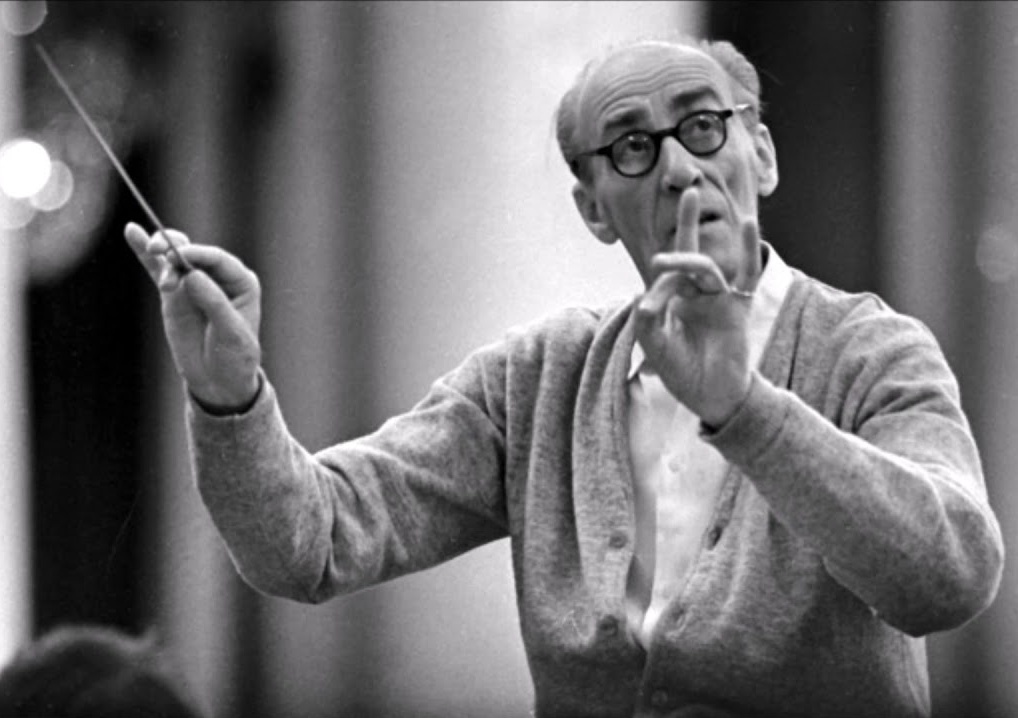 He was. It’s an incredible achievement, what he did with them in this music. I grew up there, and I heard the rehearsals. I was under a chair because you were not officially allowed. But can you imagine, 50 years of Tchaikovsky Five, for example, and he would do it at least twice in a season, and each time they would start rehearsals on a Monday to perform it on a Friday, and each time you would see, say, a cellist on the bus, and you knew they had been rigorously practising.
He was. It’s an incredible achievement, what he did with them in this music. I grew up there, and I heard the rehearsals. I was under a chair because you were not officially allowed. But can you imagine, 50 years of Tchaikovsky Five, for example, and he would do it at least twice in a season, and each time they would start rehearsals on a Monday to perform it on a Friday, and each time you would see, say, a cellist on the bus, and you knew they had been rigorously practising.
Mravinsky didn’t change his interpretations much, did he? I imagine he was fairly consistent.
He was pretty consistent, but sometimes he would be impulsive in the moment, it was only kind of obvious to those of us who really followed it, not to the general public, because he was incredibly reticent. He would show no emotion. The only emotion from him in the climax of a work, his mouth would open. And there was an explosion. The orchestra was not allowed to show any emotion either. They played deadpan, and the only way you could tell if someone was moved was when the leader’s earlobes would turn red, and you could see there was a volcano inside. But nothing otherwise. That was Mravinsky and the Leningrad Philharmonic.
I was hearing in a shared talk recently about a philosophy of the Russian violin school, that you mustn’t waste any visible emotion, that it must all go into the playing.
It is a philosophy that was connected to the national character, and particularly the Communist era, which is what we lived through, it was like that, and people, unless they really knew you, and with that came trust, would absolutely not commit, they would not express anything, it would be a mask. Behind which there would be phenomenal humour, usually quite dark, which the Czechs also have worked out to perfection in their sense of the ridiculous, and certain expressions that are hard to translate, but one of them came to mind the other day and in Russian it is "kozel ponyatno"– "kozel" is a goat and "ponyatno" means understood. So, "even a goat will understand it"... In English it doesn’t sound so funny. But you would hear those two words, and you would just die laughing, because it is so ridiculous. So, they played like that because of the circumstances, especially in St Petersburg, because it was always more restrained, Moscow was warmer, but Petersburg being the capital was like that.
But it was only a façade.
Yes. The problem is that at the time you heard things on the radio – there was no television – so you heard glorious playing, especially from the strings, that’s what we retain. But in today’s world, it’s not enough. If there is a contradiction between you and your expression and the music you play, it doesn’t fit. So if you see a group playing perfect notes, and like that, then you listen to a recording.
And the audience will only assimilate half because it is about communication.
No question about that.
It was lovely last night to see a lady in the second or third row of violins, you could see the excitement of "we’re coming to the glorious end". And it was good to see, because there would be people in that audience who might be more visual than musical.
You’re so right. Interestingly enough, and I’m so grateful for it, they play like this in rehearsals. They don’t just put on a show in the concerts. For them it’s a natural thing, to identify and express. Of course if they don’t know the piece and they’re trying to work out practical questions, that’s different because they are not free. But with the music they love and are comfortable with, they play exactly the same in rehearsal. There is no difference in the intensity level. And if I feel that there is a little dip – those strings towards the end, I see Špaček the leader, he’s just going for it, and the others just play normal, I say, please, look at Josef and please invest, and from that point on I didn’t need to say any more, because they knew [pictured below: Bychkov conducting,Špaček leading in the performance of Má vlast]. 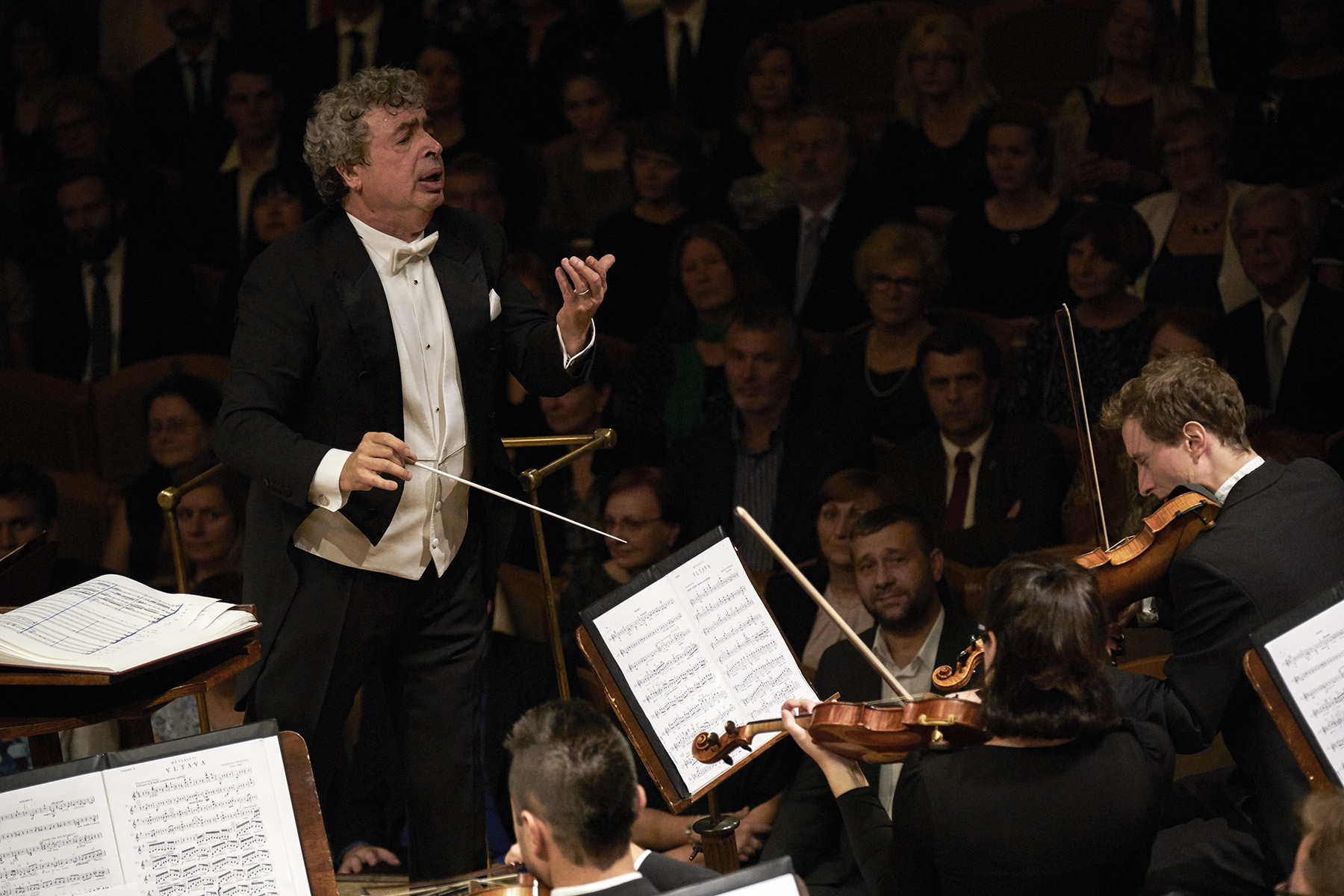 But that’s natural – it’s not even laziness, there is so much fatigue of playing this music, they’re completely exhausted, so one has to realise they need their own time to develop. But fundamentally it’s a good approach in rehearsals. That’s the way. My kids are…you know why I call them kids? Because when they asked me to come here, it was Špaček the leader who delivered a speech to the whole orchestra, and the decision was unanimous, and he made a speech at the end of a performance, I think it was Francesca da Rimini, and he said, "you bring out the best in us, we want you to be our next conductor and we want you to be our daddy." That was the sentence that broke my resolve, because I had absolutely no desire to take up a position with anyone. Now most of the players are considerably younger than me.
But that’s natural – it’s not even laziness, there is so much fatigue of playing this music, they’re completely exhausted, so one has to realise they need their own time to develop. But fundamentally it’s a good approach in rehearsals. That’s the way. My kids are…you know why I call them kids? Because when they asked me to come here, it was Špaček the leader who delivered a speech to the whole orchestra, and the decision was unanimous, and he made a speech at the end of a performance, I think it was Francesca da Rimini, and he said, "you bring out the best in us, we want you to be our next conductor and we want you to be our daddy." That was the sentence that broke my resolve, because I had absolutely no desire to take up a position with anyone. Now most of the players are considerably younger than me.
You knew Jiří Bělohlávek [the Czech Philharmonic's previous principal conductor, who died in 2017] well?
I won’t say I knew him well, but I knew him well enough to realise that there was a remarkable Mensch, a genuinely noble man, and he became the saviour of the orchestra, because he came after 20 years of complete depression, from everything I heard. And actually I witnessed it myself, and most people won’t remember it, but I conducted the Czech Philharmonic in 1990, twice. It was Shostakovich Eight, funnily enough, it was awful, the state of depression and phlegmatic attitude made it very clear to me that there was no point for me to come back. And I haven’t, for 23 years, and so I actually witnessed that. And it’s only with the arrival of the current team, and Jiří coming back, and that is another thing that made me admire him so much. The first time when he was conducting here lasted for two years. He left because he was treated unspeakably badly, and then they came back to him in 2012 to ask him to cover, and the orchestra made an internal revolution, because they knew that it was not going anywhere, and he had the strength of character to return, and this is why I call him the orchestra’s saviour.
He did such great things with the BBC Symphony Orchestra too, he transformed the string sound.
I know. And to this day they have this tender fondness of him, I know these players, and they really are a wonderful group of people in today’s constellation, and they were genuinely affected by him. That’s rare. I spoke to his wife, she was there last night, and I said to her, I’m so deeply grateful to your husband, because all of us inherit from our resources, and we don’t always inherit something wonderful, but when we do, it is to be remembered and recognised, and I said, this is my case.

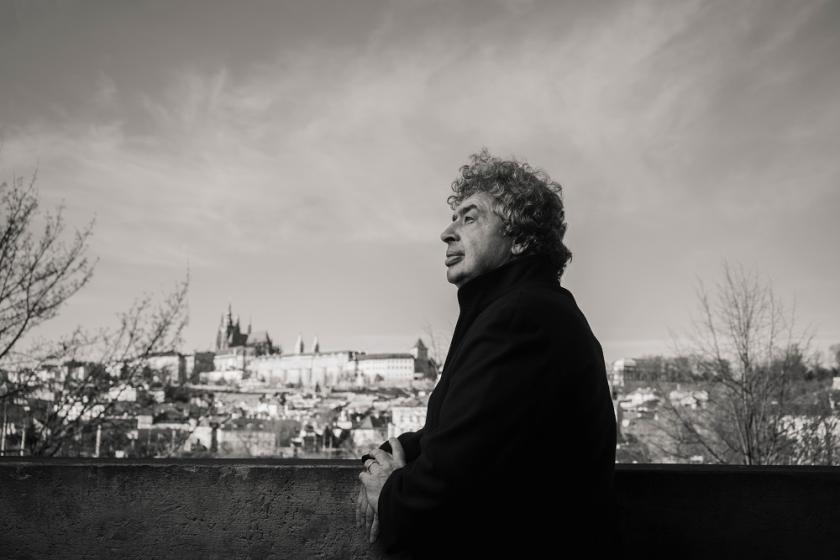













Add comment